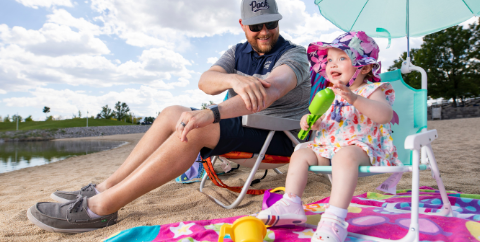Sun Smart pools program shows promise in boosting sun safety awareness among junior lifeguards
11 November, 2025
A new evaluation of the Sun Smart Nevada program at community pools found that even a brief educational session can improve young lifeguards’ understanding of ultraviolet (UV) risks and healthy sun habits—an encouraging sign for efforts to prevent skin cancer in outdoor recreation settings.
Skin cancer remains the most commonly diagnosed cancer in the United States, with more than 9,500 Americans diagnosed each day. In Nevada alone, an estimated 1,050 new cases of melanoma are expected in 2025. Because UV exposure in childhood and adolescence increases skin cancer risk later in life, programs that teach youth sun safety are a critical part of prevention.
About the study
The City of Reno’s Parks and Recreation Aquatics Department partnered with the Sun Smart Nevada initiative to adapt the Sun Smart Schools curriculum for the pool setting. The study surveyed 22 junior lifeguards, ages 11 to 14, participating in the city’s summer program.
Participants completed a short survey before and after a one-hour interactive presentation that covered five key areas of sun safety—known as the “Sun Smart 5 S’s.” Questions measured their knowledge, attitudes, and confidence about protecting themselves from UV radiation.
Before the lesson, most participants said they already practiced some form of sun protection—especially using sunscreen (96%) and seeking shade (89%). However, fewer reported wearing protective clothing (31%) or broad-brimmed hats (27%).
After the educational session:
- Knowledge about tanning beds improved significantly. Before the intervention, 42% of youth incorrectly believed tanning beds were safer than the sun; afterward, only 5% held that belief.
- Attitudes and confidence trended positively. More participants said they were “extremely likely” to practice sun safety (rising from 8% to 18%) and “completely confident” in their ability to protect themselves (rising from 42% to 50%).
- Perceived risk increased slightly. After the presentation, more participants recognized that UV exposure can have “extremely severe” health effects.
While most of these shifts were not statistically significant due to the small sample size, the results suggest that even a short, interactive intervention can strengthen awareness and motivation among young lifeguards.
Opportunities for improvement
Researchers found that many participants began the session with relatively high baseline knowledge and confidence, leaving limited room for measurable growth. To enhance future sessions, the report recommends:
- Adding content to dispel myths about tanning while using sunscreen
- Customizing lessons based on pre-survey results to better meet each group’s needs
- Spending more time addressing barriers—such as discomfort with protective clothing or disliking hats
- Expanding environmental cues, like sun safety signage and shaded rest areas at pools
The report also points to research showing that community-based programs—such as Pool Cool and Go Sun Smart—help reduce sunburns and increase sunscreen use among outdoor workers and recreation staff. Building on this evidence, it’s recommended to continue to offer and expand Sun Smart Nevada at community pools while exploring outreach in other outdoor settings like summer camps, sports leagues, and tourism venues.
You May Also Like

What the FDA’s bemotrizinol proposal means for Nevada
12.23.2025
Nevada’s sun-soaked skies are part of what makes our state beautiful — and what makes sun protection essential.

What the FDA’s bemotrizinol proposal means for Nevada
12.23.2025
Nevada’s sun-soaked skies are part of what makes our state beautiful — and what makes sun protection essential.

What the FDA’s bemotrizinol proposal means for Nevada
12.23.2025
Nevada’s sun-soaked skies are part of what makes our state beautiful — and what makes sun protection essential.